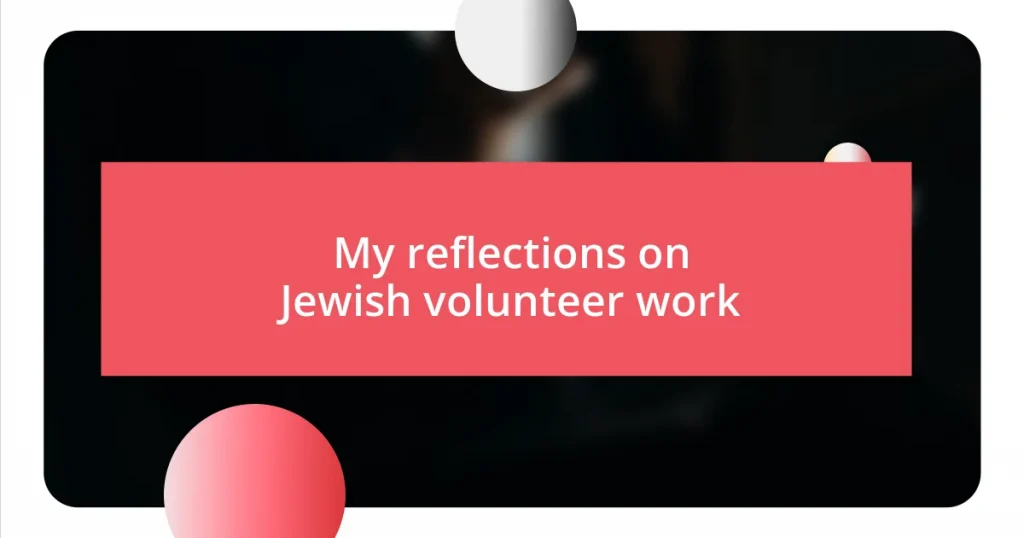Key takeaways:
- Jewish volunteer work is rooted in the values of community, tradition, and tikkun olam, emphasizing the importance of connecting generations and fostering cultural narratives.
- Community service cultivates lasting relationships, empathy, and personal growth while encouraging reflection on privileges and responsibility towards helping those in need.
- Volunteering, although rewarding, presents challenges such as time management, emotional strain, and differing expectations among volunteers, yet it ultimately leads to profound personal development and a deeper understanding of social issues.

Understanding Jewish Volunteer Work
Understanding Jewish volunteer work goes beyond simply providing help; it reflects a deep-seated commitment to community and tradition. I recall my first experience volunteering at a local Jewish community center. The joy I felt engaging with seniors and listening to their life stories truly opened my eyes to the significance of preserving our cultural narratives. Isn’t it incredible how sharing our time can weave connections across generations?
This form of volunteerism often springs from Jewish values like tikkun olam, which means “repairing the world.” I’ve found that these values drive many individuals to support various causes, whether it’s through mentoring youth or aiding the less fortunate. When I participated in a food drive during Yom Kippur, I felt the collective strength of our community come alive. How profound is it to see spirituality transform into action?
Moreover, Jewish volunteer work often thrives in collaboration with interfaith initiatives. I remember participating in a project that brought together people from diverse backgrounds to plant a community garden. Working shoulder to shoulder with others fostered an environment of mutual respect and understanding. Doesn’t that illustrate the power of unity in service? Through these experiences, I’ve come to appreciate how Jewish volunteer work enriches not only the volunteers but the community as a whole, strengthening bonds that often transcend cultural differences.
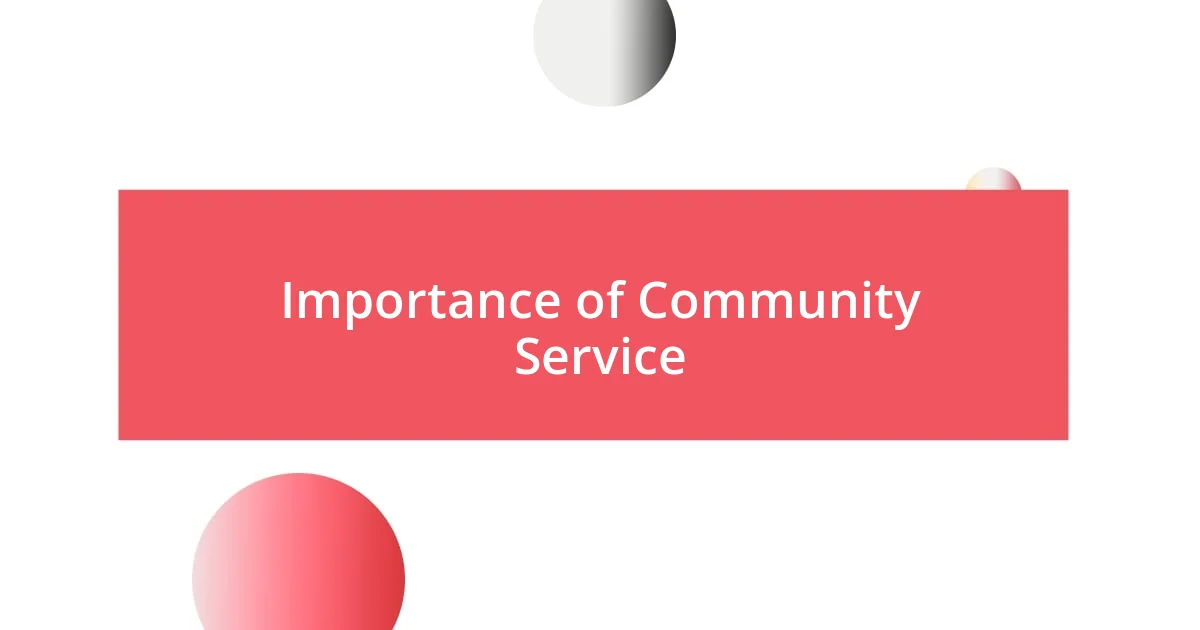
Importance of Community Service
Community service plays a crucial role in building a sense of belonging within our societies. I’ve personally experienced moments where volunteering has created lasting friendships and networks. For instance, helping out at a soup kitchen not only nourished those in need but also brought together people from all walks of life. It’s astonishing how shared purpose can forge connections, isn’t it?
In my view, the value of volunteering extends beyond the immediate impact. It fosters resilience and empathy among volunteers. I distinctly remember working on a project focused on literacy for children. Witnessing their eagerness to learn and grow reminded me of the lessons I learned during my own childhood. Such moments can be life-changing—not just for those we serve but for us as well.
Engaging in community service is also a profound way to reflect upon our privileges and responsibilities. When I joined a fundraising initiative, I was surprised to find out how many people were eager to help, regardless of their own challenges. That realization struck a chord within me. It showcases a powerful reminder: every small effort counts and contributes meaningfully to a greater good.
| Benefit of Community Service | Description |
|---|---|
| Building Connections | Volunteering fosters relationships among diverse groups, highlighting our shared humanity. |
| Personal Growth | Involvement in service allows for introspection and enhances empathy towards others’ experiences. |
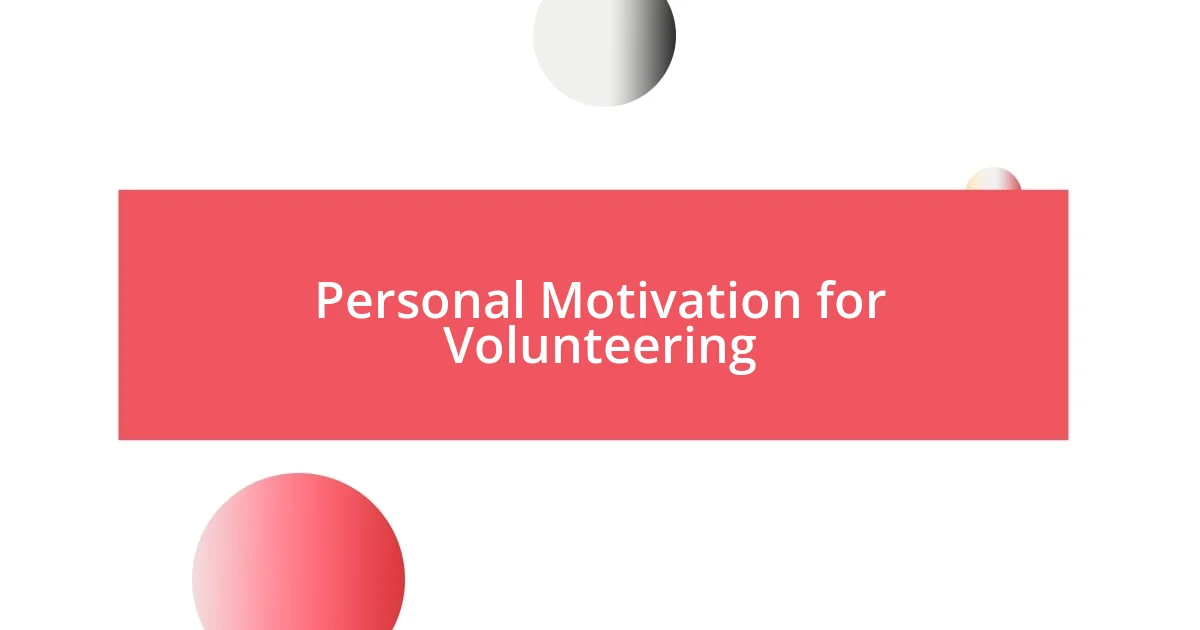
Personal Motivation for Volunteering
I’ve always believed that personal motivation for volunteering stems from a blend of life experiences and a deep-rooted sense of responsibility. I remember a particular moment during my time at a senior care home, where I’d bring in homemade challah regularly. One elderly resident, with her eyes twinkling, shared how the simple act of sharing bread sparked memories of her childhood in Poland. It profoundly moved me to realize that even a small gesture can bridge the gap between generations and cultures.
Here are a few key motivations that resonate with many who choose to volunteer:
- Cultural Connection: Engaging in volunteer work connects me to my heritage and fosters a sense of pride in my roots.
- Empathy and Understanding: Volunteering allows me to step into the shoes of others, deepening my comprehension of diverse struggles.
- Community Responsibility: I believe it’s essential to give back to the community that nurtures us, ensuring no one is left behind.
Reflecting on these motivations invigorates my passion for volunteering, reminding me of the purpose behind every action.
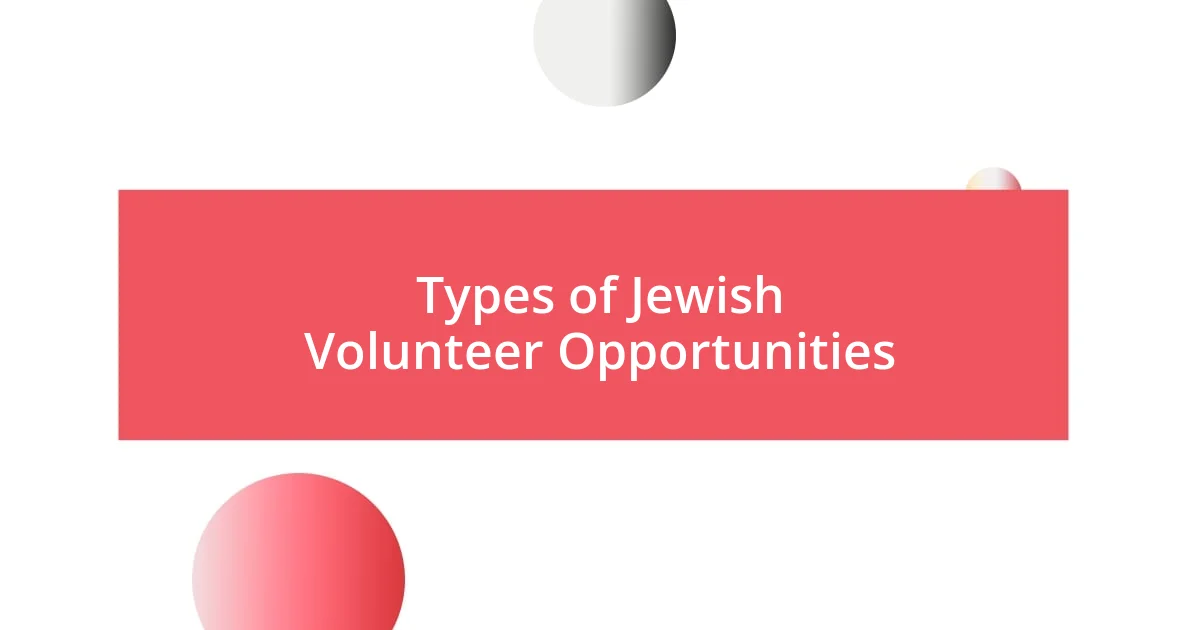
Types of Jewish Volunteer Opportunities
When I think about the various types of Jewish volunteer opportunities, I’m reminded of how diverse and fulfilling they can be. One standout experience for me was participating in a local food drive organized by my synagogue. Seeing the community come together, packing bags of food for families in need, really underscored the spirit of tikkun olam—repairing the world. Have you ever felt that sense of unity in action?
In addition to food drives, there are many other avenues to explore. For instance, tutoring children in Jewish schools offers a beautiful way to pass on our traditions while enriching their lives. I remember helping a young girl with her Hebrew reading; her smile lit up the room when she finally got a handle on a particularly tricky word. It’s moments like that which remind me of the impact we can make, one child at a time.
Another valuable opportunity lies in interfaith initiatives. My participation in a dialogue series with different faith communities opened my eyes to the shared values we all cherish. It was heartwarming to witness how discussing our differences led to building genuine friendships. Have you ever considered how much we can learn from one another through these exchanges? Engaging in such opportunities is essential in fostering understanding and compassion across communities.
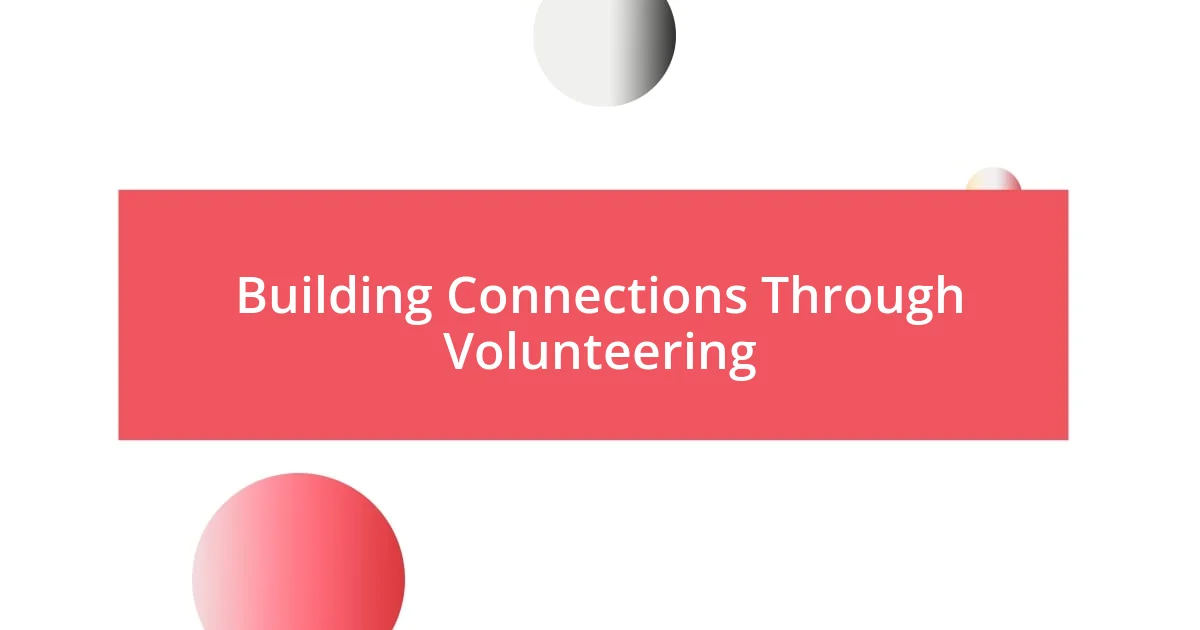
Building Connections Through Volunteering
Building authentic connections through volunteering has been one of the most rewarding aspects of my involvement in various community service projects. I remember one evening at a local shelter where I served dinner. After helping set the tables, I sat down and shared stories with the guests. Listening to their experiences made me realize how much we share as human beings, despite our different circumstances. Have you ever had a conversation that completely changed your perspective? I certainly did that night.
What truly touches my heart is the way volunteering creates bonds that transcend surface-level interactions. During my time volunteering at a community garden, I met a retired teacher who shared her passion for sustainable living. Together, we nurtured plants while exchanging life lessons. Those moments helped me develop friendships that I still treasure today. It’s incredible to think that some of the best relationships I’ve formed came from a shared commitment to making a difference.
Even in large group settings, there’s a unique sense of camaraderie that emerges. I vividly recall volunteering at a large event to raise awareness for mental health. As we worked side by side, strangers quickly became companions, united by our common goal. Do you ever notice how working towards a shared purpose draws people closer? This blending of efforts often lays the groundwork for ongoing connections that can evolve into long-lasting friendships, enriching our lives in ways we never anticipated.
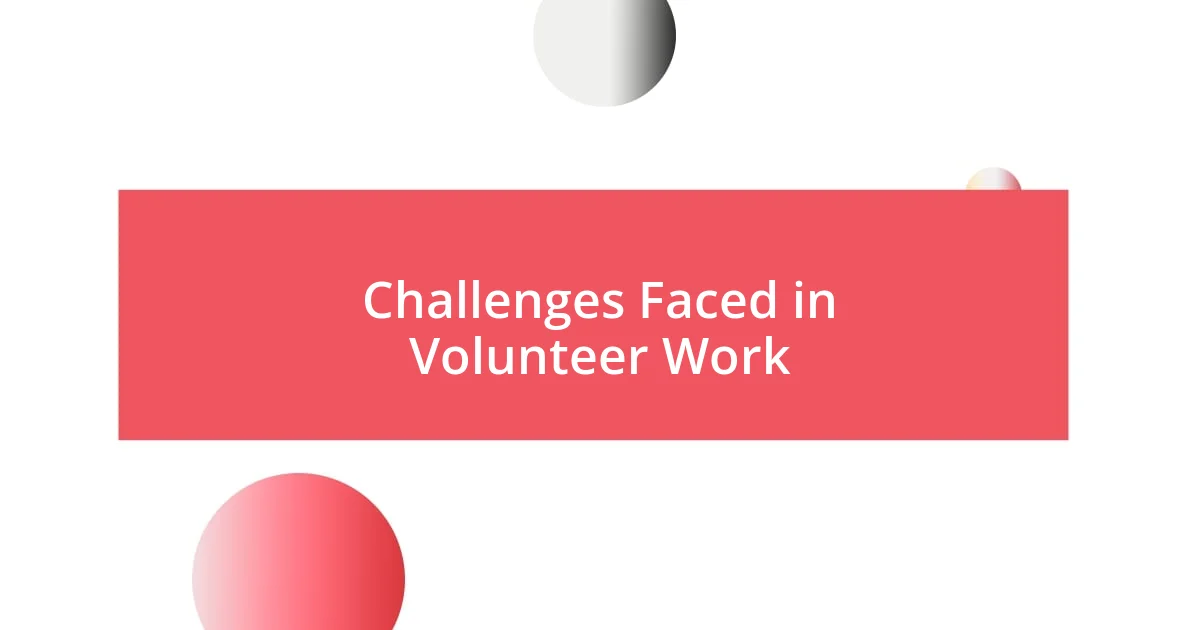
Challenges Faced in Volunteer Work
It’s not all smooth sailing when you’re knee-deep in volunteer work. One of the most significant challenges I’ve faced is managing time. Balancing a volunteer commitment with work and personal life can be tricky. I once signed up for a weekly tutoring session, eager to make a difference, but soon found myself frazzled, running from one commitment to another. Have you ever felt the weight of too many responsibilities pressing down on your passion for helping others?
Another hurdle that often surfaces is the emotional toll involved in volunteer work. Helping people in dire circumstances can be heartbreaking, and it’s easy to feel powerless at times. I remember working at a shelter during a particularly cold winter night. Seeing families struggling to find warmth rattled me, and I questioned whether my efforts could truly help. How do you cope with the heavy emotions that come with such experiences? For me, sharing those feelings with fellow volunteers became a lifeline, a reminder that I wasn’t alone in my journey.
Lastly, navigating differing expectations among volunteers can create friction. I recall an event where everyone had varying ideas about how to run a community project. Some pushed for efficiency while others emphasized building relationships. It made me wonder: How do we find common ground when each person has their own vision? The dialogue that emerged from these differences was challenging but ultimately rewarding, as it fostered a deeper understanding of teamwork and collaboration.
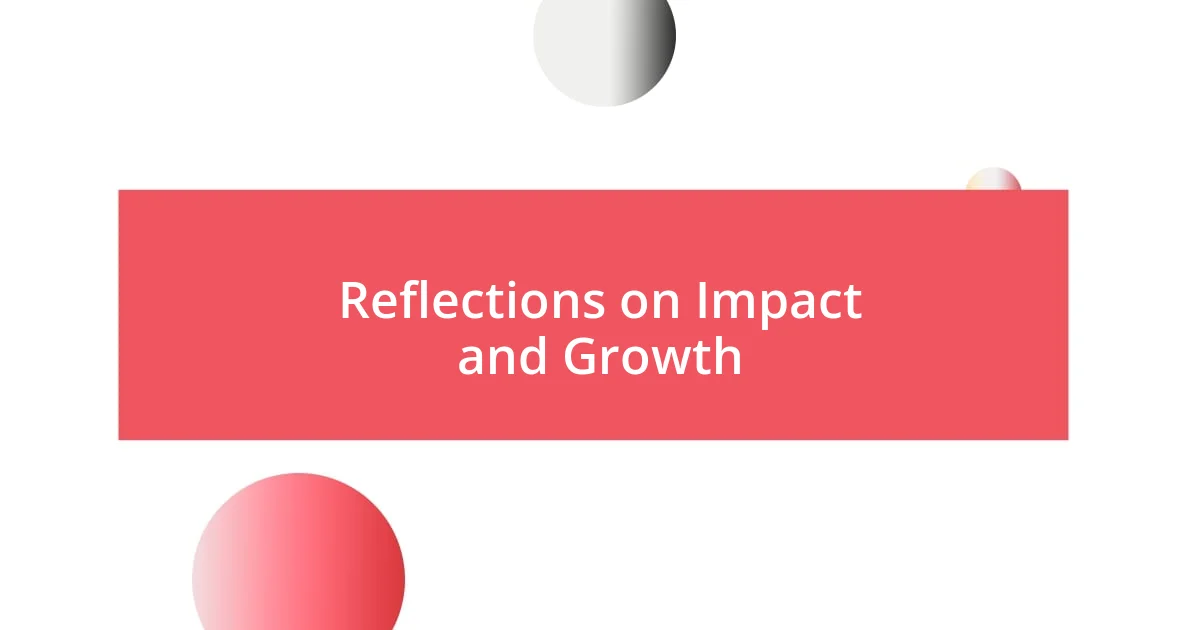
Reflections on Impact and Growth
Engaging in Jewish volunteer work deeply influenced my personal growth. I remember one particularly meaningful moment while volunteering at a local food pantry. After handing out meals, I struck up a conversation with a single mother who shared her challenges with finding stable employment. Hearing her story not only opened my eyes to the systemic issues many face, but it also reinforced my commitment to advocate for change. Have you ever had your understanding of a problem shift dramatically after hearing someone’s personal experience like that?
Reflecting on this journey, I’ve seen how such interactions can catalyze growth in ourselves and others. For example, tutoring children from diverse backgrounds was initially intimidating for me. With each session, I not only shared knowledge but also learned about the unique challenges they faced in their lives. It dawned on me that teaching is a two-way street; we grow together through these exchanges. Isn’t it fascinating how the act of helping can enhance our own perspectives?
Ultimately, the impact of volunteering extends beyond immediate contributions; it fosters resilience and compassion. I recall a day at a mentorship program where we shared stories of personal struggles and triumphs. The raw honesty resonated with everyone, creating a safe space for vulnerability. It made me appreciate that every volunteer carries their own stories, and sharing these experiences builds a stronger community. Have you ever found healing in connecting with others through similar paths? Such reflections leave a lasting impression on my journey of personal growth.










